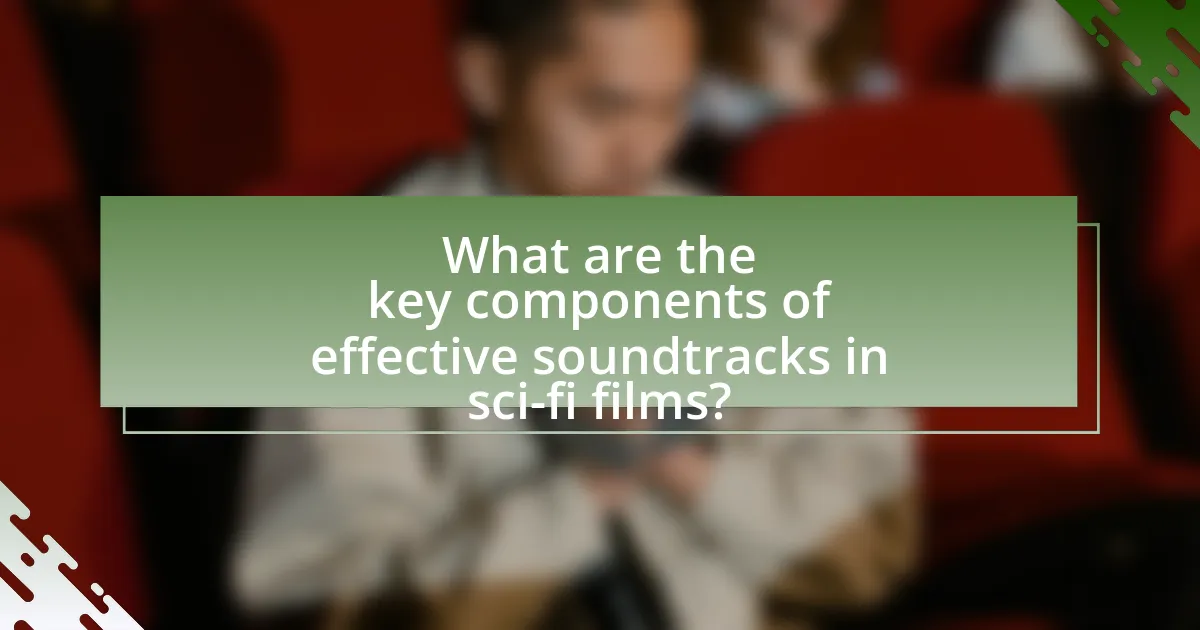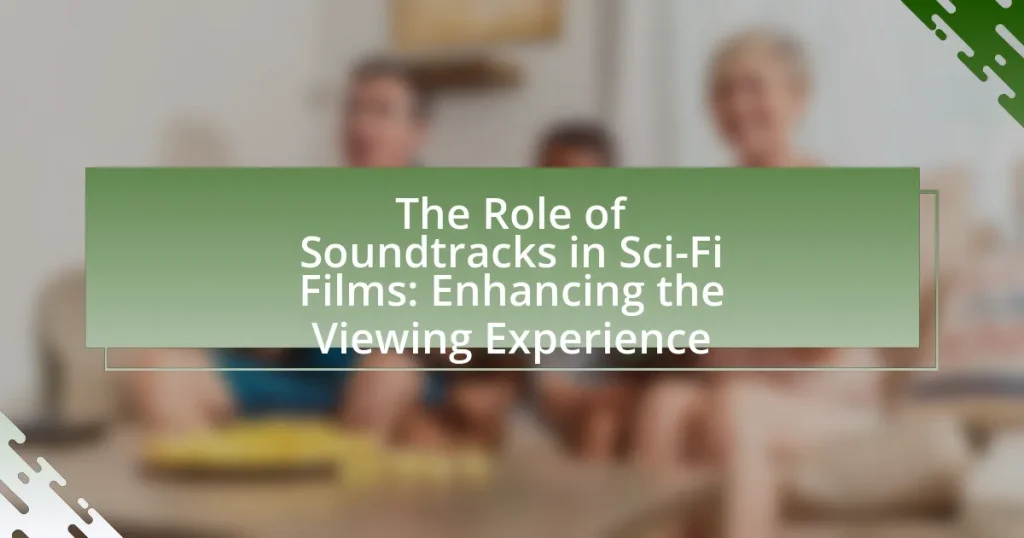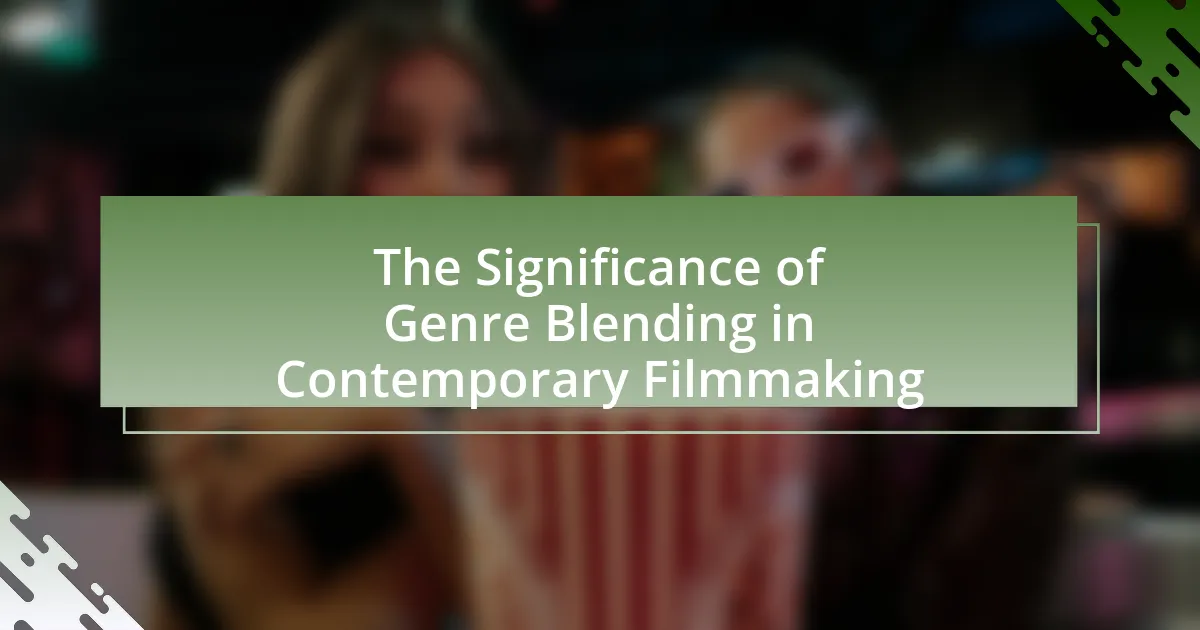The article examines the critical role of soundtracks in sci-fi films, highlighting how they enhance emotional depth and atmospheric immersion. It discusses the various elements of soundtracks, including orchestration, thematic motifs, and sound design, which contribute to audience engagement and narrative effectiveness. The piece also explores the psychological effects of music on viewers, the impact of soundtracks on box office performance, and best practices for integrating music into sci-fi storytelling. Additionally, it addresses common pitfalls filmmakers should avoid when selecting soundtracks, emphasizing the importance of originality and thematic relevance.

What is the role of soundtracks in sci-fi films?
Soundtracks in sci-fi films play a crucial role in enhancing the emotional and atmospheric depth of the narrative. They create an immersive experience that helps to establish the film’s tone, evoke specific emotions, and underscore key moments in the story. For instance, the use of electronic music in films like “Blade Runner” not only reflects the futuristic setting but also amplifies the themes of isolation and existentialism. Additionally, soundtracks can serve to bridge the gap between the audience and the fantastical elements of the story, making the extraordinary feel more relatable and engaging. This is evident in the work of composers like John Williams, whose scores for films such as “Star Wars” have become iconic, reinforcing the epic scale and adventure inherent in the genre.
How do soundtracks contribute to the overall atmosphere of sci-fi films?
Soundtracks significantly enhance the overall atmosphere of sci-fi films by creating emotional depth and establishing a sense of otherworldliness. The use of synthesized sounds and orchestral compositions evokes feelings of tension, wonder, or fear, which are essential in immersing the audience in futuristic or alien settings. For instance, the score of “Blade Runner,” composed by Vangelis, combines electronic music with orchestral elements to reflect the film’s themes of dystopia and humanity, effectively drawing viewers into its complex narrative. This integration of sound and visuals not only supports the storytelling but also shapes the audience’s emotional responses, making the experience more impactful.
What elements of soundtracks enhance the emotional impact of sci-fi narratives?
Elements of soundtracks that enhance the emotional impact of sci-fi narratives include orchestration, thematic motifs, and sound design. Orchestration utilizes a blend of traditional and electronic instruments to create a unique auditory landscape that reflects the futuristic themes of sci-fi. Thematic motifs serve as musical signatures for characters or concepts, allowing audiences to form emotional connections through recurring melodies. Sound design incorporates ambient sounds and effects that immerse viewers in the sci-fi world, heightening tension and evoking feelings of wonder or fear. For instance, the use of synthesizers in films like “Blade Runner” creates a haunting atmosphere that complements the narrative’s exploration of humanity and technology.
How do soundtracks reflect the themes and settings of sci-fi films?
Soundtracks in sci-fi films reflect themes and settings by using specific musical elements that evoke emotions and enhance the narrative. For instance, electronic sounds often signify futuristic technology, while orchestral scores can underscore epic battles or emotional moments, creating a sense of grandeur. A notable example is the soundtrack of “Blade Runner,” composed by Vangelis, which combines synthesizers with orchestral elements to convey a dystopian atmosphere and explore themes of humanity and artificial intelligence. This integration of music and thematic content is crucial, as studies show that soundtracks can significantly influence audience perception and emotional engagement, reinforcing the film’s setting and underlying messages.
Why are soundtracks essential for audience engagement in sci-fi films?
Soundtracks are essential for audience engagement in sci-fi films because they create an immersive atmosphere that enhances emotional responses and narrative depth. The unique soundscapes in sci-fi films often utilize electronic and orchestral elements to evoke feelings of wonder, tension, or fear, which are crucial for conveying the film’s themes and settings. For instance, the soundtrack of “Blade Runner,” composed by Vangelis, combines synthesizers with orchestral arrangements to reflect the film’s dystopian future, effectively drawing viewers into its world. This auditory experience not only complements the visual elements but also reinforces character development and plot progression, making the audience more invested in the story.
How do soundtracks influence audience perception and interpretation of sci-fi stories?
Soundtracks significantly influence audience perception and interpretation of sci-fi stories by shaping emotional responses and enhancing narrative context. The music in sci-fi films often establishes the atmosphere, guiding viewers’ feelings and expectations; for instance, a suspenseful score can heighten tension during critical moments, while a serene melody may evoke wonder during expansive space scenes. Research indicates that soundtracks can alter the way audiences process visual information, as demonstrated in studies where participants reported different emotional reactions based on the accompanying music, even when viewing the same scenes. This interplay between sound and visuals is crucial in sci-fi, where complex themes and futuristic settings require effective emotional engagement to facilitate understanding and immersion.
What psychological effects do soundtracks have on viewers during sci-fi films?
Soundtracks in sci-fi films significantly influence viewers’ psychological responses by enhancing emotional engagement and shaping narrative perception. Research indicates that music can evoke specific emotions, such as tension or excitement, which aligns with the film’s themes and visuals. For instance, a study published in the Journal of Experimental Psychology found that soundtracks can manipulate viewers’ emotional states, leading to heightened suspense or joy, depending on the musical cues used. Additionally, soundtracks help establish a sense of immersion, allowing viewers to connect more deeply with the sci-fi narrative, as evidenced by findings from the University of Southern California, which highlight that music can enhance the perceived realism of fantastical elements in films.

What are the key components of effective soundtracks in sci-fi films?
Effective soundtracks in sci-fi films primarily consist of atmospheric soundscapes, thematic motifs, and innovative instrumentation. Atmospheric soundscapes create immersive environments that enhance the futuristic or alien settings typical of the genre, as seen in films like “Blade Runner,” where the sound design complements the visual aesthetics. Thematic motifs provide recognizable musical themes associated with characters or concepts, which help to establish emotional connections; for example, John Williams’ score for “Star Wars” features distinct themes for characters like Darth Vader. Innovative instrumentation often incorporates electronic elements and unconventional sounds, reflecting the technological advancements and otherworldly aspects of sci-fi narratives, as demonstrated by Hans Zimmer’s use of synthesizers in “Interstellar.” These components work together to elevate the storytelling and emotional impact of sci-fi films.
What types of music are commonly used in sci-fi soundtracks?
Sci-fi soundtracks commonly utilize electronic music, orchestral compositions, and ambient soundscapes. Electronic music, characterized by synthesized sounds and futuristic tones, is prevalent due to its ability to evoke otherworldly atmospheres, as seen in films like “Blade Runner.” Orchestral compositions often blend traditional instruments with modern techniques, creating a grand and epic feel, exemplified by scores from composers like John Williams in “Star Wars.” Ambient soundscapes enhance the immersive experience by providing a sonic backdrop that complements visual elements, as demonstrated in films like “Interstellar.” These musical styles collectively enhance the emotional and narrative depth of sci-fi films.
How do orchestral scores differ from electronic music in sci-fi films?
Orchestral scores in sci-fi films differ from electronic music primarily in their instrumentation and emotional delivery. Orchestral scores utilize traditional instruments like strings, brass, and woodwinds, creating a rich, layered sound that often evokes a sense of grandeur and emotional depth, as seen in scores by composers like John Williams for “Star Wars.” In contrast, electronic music relies on synthesized sounds and digital manipulation, producing a more futuristic and sometimes dissonant atmosphere, exemplified by the work of Hans Zimmer in “Blade Runner 2049.” This distinction influences how audiences perceive the narrative; orchestral scores often enhance the epic scale of the story, while electronic music can underscore themes of technology and alienation.
What role do sound effects play alongside music in enhancing sci-fi soundtracks?
Sound effects play a crucial role alongside music in enhancing sci-fi soundtracks by creating an immersive auditory experience that complements the visual elements of the film. These effects contribute to world-building, establishing the unique atmosphere and tone characteristic of science fiction. For instance, the use of futuristic sounds, such as electronic beeps or mechanical whirrs, helps to convey advanced technology and alien environments, thereby deepening the viewer’s engagement with the narrative. Research indicates that sound design significantly influences audience perception and emotional response, with studies showing that well-crafted soundscapes can enhance suspense and excitement, making scenes more impactful. This synergy between sound effects and music ultimately enriches the storytelling, allowing for a more profound connection to the film’s themes and characters.
How do composers create memorable soundtracks for sci-fi films?
Composers create memorable soundtracks for sci-fi films by utilizing innovative instrumentation, thematic motifs, and sound design that evoke the genre’s unique atmosphere. They often blend traditional orchestral elements with electronic sounds to reflect futuristic themes, as seen in scores like Hans Zimmer’s work for “Interstellar,” which combines strings with synthesized tones to create emotional depth and a sense of vastness. Additionally, composers develop recurring themes that represent characters or concepts, enhancing audience connection and engagement, exemplified by John Williams’ iconic themes in “Star Wars.” This strategic use of music not only supports the narrative but also amplifies the emotional impact, making the soundtrack an integral part of the sci-fi experience.
What techniques do composers use to evoke specific emotions in sci-fi soundtracks?
Composers use techniques such as thematic development, instrumentation, and harmonic language to evoke specific emotions in sci-fi soundtracks. Thematic development involves creating memorable motifs that represent characters or concepts, allowing audiences to connect emotionally. Instrumentation plays a crucial role, with composers often utilizing synthesizers and unconventional instruments to create otherworldly sounds that enhance the futuristic atmosphere. Harmonic language, including the use of dissonance and unconventional scales, can evoke feelings of tension or unease, which are common in sci-fi narratives. For instance, the use of minor keys and complex rhythms can heighten suspense, while lush, major chords may evoke hope or wonder. These techniques collectively contribute to the emotional depth and immersive experience of sci-fi films.
How do collaborations between directors and composers shape the soundtrack’s effectiveness?
Collaborations between directors and composers significantly enhance the effectiveness of a soundtrack by ensuring that the music aligns with the film’s narrative and emotional tone. This synergy allows composers to create scores that reflect the director’s vision, resulting in a cohesive audio-visual experience. For instance, in films like “Blade Runner,” director Ridley Scott worked closely with composer Vangelis, leading to a soundtrack that perfectly encapsulated the film’s dystopian atmosphere and emotional depth. Such collaborations often involve discussions about themes, character arcs, and pivotal scenes, enabling composers to tailor their music to specific moments, thereby amplifying the audience’s emotional response. This partnership ultimately shapes how viewers perceive and engage with the film, making the soundtrack an integral part of the storytelling process.

What impact do soundtracks have on the success of sci-fi films?
Soundtracks significantly enhance the success of sci-fi films by creating emotional depth and reinforcing narrative themes. A well-composed soundtrack can elevate the viewer’s experience, making scenes more impactful and memorable. For instance, the score of “Blade Runner” by Vangelis is often cited for its ability to evoke a sense of wonder and melancholy, contributing to the film’s critical acclaim and lasting influence. Research indicates that films with compelling soundtracks tend to achieve higher box office revenues and audience ratings, as evidenced by studies showing that music can influence emotional responses and engagement levels in viewers.
How do soundtracks influence box office performance and critical reception?
Soundtracks significantly influence box office performance and critical reception by enhancing emotional engagement and brand recognition. Research indicates that films with memorable soundtracks often achieve higher box office revenues; for instance, “Guardians of the Galaxy” generated over $773 million globally, partly due to its nostalgic and popular soundtrack, which resonated with audiences. Additionally, soundtracks can shape critical reception; films like “Inception,” which featured a compelling score by Hans Zimmer, received widespread acclaim, reflected in its 86% rating on Rotten Tomatoes. This correlation between soundtracks and both financial success and critical approval underscores their vital role in the overall impact of a film.
What examples illustrate the correlation between soundtracks and a film’s popularity?
The correlation between soundtracks and a film’s popularity is exemplified by the success of “Star Wars” and “Guardians of the Galaxy.” The “Star Wars” soundtrack, composed by John Williams, not only became iconic but also significantly contributed to the franchise’s cultural impact, leading to its status as a blockbuster series. Similarly, “Guardians of the Galaxy” featured a curated mix of classic songs that resonated with audiences, enhancing its appeal and contributing to its box office success, with the film grossing over $773 million worldwide. These examples demonstrate that memorable soundtracks can elevate a film’s popularity by enhancing emotional engagement and audience connection.
How do iconic soundtracks contribute to the legacy of classic sci-fi films?
Iconic soundtracks significantly enhance the legacy of classic sci-fi films by creating an emotional connection and establishing a memorable atmosphere. For instance, the score of “Star Wars,” composed by John Williams, not only defines the film’s identity but also evokes nostalgia and excitement, contributing to its enduring popularity. Additionally, soundtracks like Vangelis’s “Blade Runner” score set a distinct tone that complements the film’s themes of dystopia and humanity, reinforcing its status as a cinematic classic. These soundtracks often become synonymous with the films themselves, influencing future works and solidifying their place in cultural history.
What are some best practices for integrating soundtracks in sci-fi films?
Best practices for integrating soundtracks in sci-fi films include creating a thematic score that reflects the film’s futuristic elements, using sound design to enhance world-building, and ensuring the music complements the narrative pacing. A thematic score, such as the one composed by Hans Zimmer for “Interstellar,” effectively captures the emotional depth and vastness of space, reinforcing the film’s themes. Additionally, sound design plays a crucial role; for instance, the use of synthesized sounds in “Blade Runner” immerses viewers in a dystopian atmosphere, enhancing the visual experience. Finally, aligning the soundtrack with the film’s pacing, as seen in “Star Wars,” where music swells during climactic moments, ensures that the audience remains engaged and emotionally connected to the story.
How can filmmakers effectively choose or create soundtracks that enhance storytelling?
Filmmakers can effectively choose or create soundtracks that enhance storytelling by aligning musical elements with the emotional tone and narrative arc of the film. This alignment ensures that the soundtrack complements key moments, evokes specific feelings, and reinforces character development. For instance, a study by the University of Southern California found that music significantly influences audience emotional responses, with 80% of participants reporting heightened emotional engagement when soundtracks matched the film’s mood. By selecting or composing music that reflects the themes and emotions present in the narrative, filmmakers can create a more immersive and impactful viewing experience.
What common pitfalls should filmmakers avoid when selecting soundtracks for sci-fi films?
Filmmakers should avoid using generic or clichéd soundtracks when selecting music for sci-fi films. Generic soundtracks can undermine the unique atmosphere and emotional depth that sci-fi narratives often require, leading to a disconnection between the audience and the film’s themes. Additionally, filmmakers should be cautious of overusing popular music, as it can distract from the story and create an unintended association that detracts from the film’s originality. Research indicates that soundtracks specifically tailored to the film’s narrative enhance viewer engagement and emotional response, making it crucial for filmmakers to prioritize originality and thematic relevance in their soundtrack choices.




